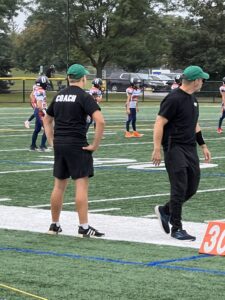October 2023
Football and Brokerage with Kelly Disser and Adam Roth

As the calendar shifts to Autumn, the temperature is dropping, leaves are changing colors, certain coffee shops are promoting certain seasonal flavors and weekends are filled with football.
On the surface, you might not think of any comparisons to make between the industrial side of commercial real estate and the most popular sport in the United States of America. However, a surprising number of CRE professionals have experience in the game of football, experience that has paid dividends in the development of their professional careers.
We recently sat down with Kelly Disser and Adam Roth, two executive vice presidents – industrial services, to find out how their active involvement in football translates to the ever-changing world of industrial brokerage.
Tell us about your background in football.
• Disser: “I grew up in Fort Wayne, Indiana and my first year of tackle football was 6th grade in the Police Athletic League. We didn’t score a touchdown the whole season, we were brutal. 7th and 8th grade at Woodside Middle School, I played Quarterback and Safety then played at Homestead High School in Fort Wayne. We had a great team and great coaches. Rex Grossman and I were the two all-state quarterbacks in 1999 and we ended up both undefeated and playing each other in the 5A state finals at the RCA Dome in Indianapolis. I went to Butler University and came in as a quarterback but wanted to play immediately, so requested a position change to play cornerback, which I did and traveled / started my freshman and sophomore year. Going through the position change, I learned an important lesson in patience which has served me well professionally. I sat out my junior year, then I came back to the team for a senior year and fifth year and started at receiver. Now, I’m coaching 5th grade tackle football, it’s great to get back into it.”
• Roth: “I played football from 5th grade all the way through high school in Ohio on the offensive and defensive line. My oldest son is now on the sophomore team in high school and I coached for him through rec leagues. I’m currently the head coach of my twins’ 10-year-old football team. We have a hand signal defense and a schematic, wristband play calling system for our offense. Over the course of a season, it’s amazing how much you build as a team and essentially create your own language that you have to operate at a high speed. We tell our team our greatest enemy is hesitation.”
You hear about the competitiveness of both football and brokerage very often. Beyond that, what other similarities do you see in your role to serve your clients?
• Disser: “Football was tough, it was a grind and I do feel like a lot of that transitions to brokerage, it’s a brutally tough business. It takes a lot of hard work and a long time to find success. The little things that you do in football with training, forcing yourself to do that every day is similar to the little things that we do here with cold calling, knocking on doors, marketing our clients to hire us to sell or lease a building. It is hard, it is not fun, but it’s the foundation you build on. I think the perception is that brokers put up a sign and they wait for the phone to ring. I’m sure some people do that, but we try to expedite the timeline and find those buyers and tenants sooner to get results because ultimately to them, time is money every day that a building is vacant. We try not to waste any time or any days, time is money.”
• Roth: “I think it’s a lot of blocking and tackling and the basics. What is the client’s requirement? What is their objective? What audibles can you call throughout the negotiation that puts your client in the best spot to win? All deals are fragile so it’s important to put them in the best position to achieve their specific objectives.”
A common philosophy in football is ‘establish the ground game first’ because that opens up everything else. What would you say is the ‘ground game’ in brokerage that you try to establish to open up other possibilities?
• Disser: “One part of that is developing a personal relationship, get to know your client. What’s their situation? What are their hobbies? What are their interests? You also have to establish trust and respect in their understanding that you know the market and that you’re giving them the proper guidance and protecting their interests, which takes time. As an offense, you install the playbook with time, it’s not all at once.”
• Roth: “Establish trust by looking out solely for their interests, not your own. In my opinion, it’s advantageous to both you and your client to have a thorough knowledge of what’s happening in the supply chain space, because that is a larger dictator than rental rate. Conversely, real estate can be utilized to combat transportation spend.”
In both football and brokerage, it’s essential to think on your feet and make adjustments on the fly. What are some examples of how you make ‘in-game adjustments’ as a broker?
• Disser: “As an example, a client might tell me they want a 200,000 square feet building with this many docks, this many doors, this many parking spots, but the reality is, in most cases, that building in that exact form may not exist, so you’ve got to work through it. Making it parallel to football, what does the defense give you? Sometimes you have to take what they give you. That’s the reason why a lot of these deals take a long time, because maybe what they’re looking for is not out there today. You want to make sure you have a good relationship and good communication because you’re often working with a person or team for several years.”
• Roth: “It happens with every deal. The available options change in real time as the market is dynamic. You have to be able to pivot as the perfect fit rarely exists and clients often alter their requirement from size, buildout need, timing to geographic focus. Similar to in game adjustments based on the other team’s tactics.”
Special teams plays occur, on average, once every six plays in a football game. It doesn’t get the majority of the focus that offense and defense get but it can just as easily affect the outcome of a game. What would you say is the ‘special teams’ of brokerage?
• Disser: “I view it more as every single play, every player’s got a job to do, whether it’s on offense, defense or special teams. You can’t take a play off or else you’re going to hurt yourself or a teammate. Everyone must execute their role for the play to be successful So, I view it as every day, I come in and do what I need to do. You can’t take anything for granted because when you let up, that’s when your client gets an e-mail from another broker down the street with the building that just came on the market next door to him. I tell this to our team all the time – speed kills. That’s a great football analogy, we are in a service industry so your timing and your effort matters. Clients see that, so that’s how you can differentiate yourself, the quality, frequency and timeliness of information that you can provide to your client.”
• Roth: “The special teams of brokerage are beyond the basic market vacancy, market rates, and market incentives. It’s the additional value that you can bring to your client. That could be rail expertise, it could be drayage expertise or transportation. What are you bringing beyond the traditional market intelligence that separates you from your competition and also puts your client in a position to utilize their real estate as a competitive advantage.
Which current head coach would make the best broker?
• Disser: “Deion Sanders (University of Colorado). He’s put in the work so far, he expects a lot of his players and tells it how it is. I also like Bill Belichick because of how analytical he is and his attention to detail.”
• Roth: “That’s the first time I’ve ever imagined that question. I’m going to say Kevin Stefanski of the Cleveland Browns because I grew up in the Cleveland area. He seems to have an organized, well-thought out plan for every game. And he seems to have the ability to pivot in game and I think that’s a large part of brokerage.”
- Adam Roth (right) and his oldest son (left) coach the Elmhurst Eagles
About NAI Hiffman:
NAI Hiffman is one of the largest independent commercial real estate services firms in the US, with a primary focus on metropolitan Chicago, and part of the NAI Global network. We provide institutional and private leasing, property management, tenant representation, capital markets, project services, research, and marketing services for owners and occupiers of commercial real estate. To meet our clients’ growing needs outside of our exclusive NAI Hiffman territory, we launched Hiffman National, our dedicated property solutions division, which provides property management, project services, and property accounting services across the country. NAI Hiffman | Hiffman National is an award winning company headquartered in suburban Chicago, with more than 250 employees strategically located throughout North America.
About Hiffman National:
Hiffman National is one of the US’s largest independent commercial real estate property management firms, providing institutional and private clients exceptional customized solutions for property management, project management, property accounting, lease administration, marketing, and research. The firm’s comprehensive property management platform and attentive approach to service contribute to successful life-long relationships and client satisfaction. As a nationally bestowed Top Workplace, and recognized CRE award winner, Hiffman National is headquartered in suburban Chicago, with more than 250 employees nationally and an additional six hub locations and 25 satellite offices across North America.



